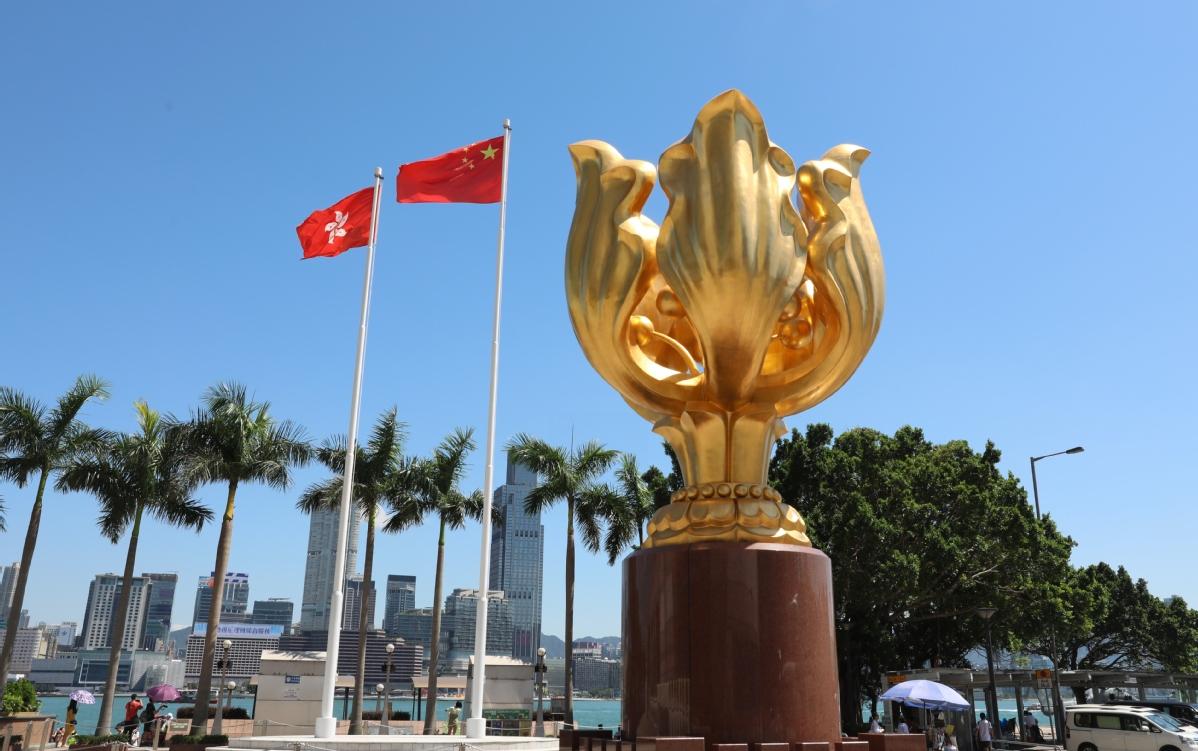
Photo taken on Aug 5, 2019 shows China's national flag and the flag of the Hong Kong Special Administrative Region on the Golden Bauhinia Square in Hong Kong, China. [Photo/Xinhua]
This is an editorial from China Daily.
Hong Kong lawmakers unanimously passed a bill mandated by Article 23 of the Basic Law of Hong Kong on Tuesday, which will take effect on Saturday.
By fulfilling a constitutional obligation, the move marks the city taking another key step forward in plugging the loopholes in its legal system that had long been used by some to threaten national security in the city.
The bill, also known as Safeguarding National Security Ordinance, seeks to prohibit five acts that endanger national security while updating provisions within existing laws. It was the unrest that convulsed Hong Kong in 2019, which was orchestrated by external forces with the help of their local pawns, that prompted the legislative and executive bodies of the special administrative region to accelerate the drafting and review procedures of the bill. Only 50 days separated the start of the public consultation and Tuesday's passing of the bill.
While some China-bashers in the United States have tried to find fault with the short time it took for the bill to complete all the procedures, they simply ignore that US Congress passed the Patriot Act within just three days after its introduction following the terrorist attacks on Sept 11, 2001.
It is the implementation of Hong Kong's national security law since 2020 and the series of executive and electoral system reforms that followed that have paved the way for the smooth passage of the bill. By denying the external forces' proxies having a seat in the city's legislature and government departments, they have not been able to have the bill shelved. The efficiency with which the bill passed the mandatory reviews demonstrates the previous efforts to bring the SAR from chaos to order have paid off.
Some lawmakers have called the drafting of the bill, and the readings of and debates on it as a homework delayed for more than 20 years since it was first proposed, and have described the process as being of "high quality, high-score-deserved, and strictly in accordance with the legislative procedures", which featured clause-by-clause scrutiny, positive interactions and efficient deliberations between the legislative and executive branches of the SAR. The lawmakers raised many questions concerning the bill, citing almost all public concerns, which have been appropriately addressed.
Thanks to these endeavors, the bill clearly defines national security, and the criteria for the acts that can be recognized as endangering national security. Basically, the bill is expected to uphold the law, order, security and safety in Hong Kong. That not only reflects the common will of people in Hong Kong but also can provide a boost for Hong Kong's productive interaction with the rest of the world. The normal business, financial, logistics, cultural, social and people-to-people exchanges between Hong Kong and the world will only be encouraged and better protected by the bill. By providing clear legal guidelines and strong protection for people's lives, property, freedom and rights, the bill will be conducive to maintaining the city's unique advantages and status as an international financial, business and logistics center.
It is essential for lawmakers to thoroughly explain to the public in detail the legislative intent behind individual clauses, the risks to national security they aim to address and how the clauses will be applied in practice in the future so that cooperation between Hong Kong and the world can be carried out following more predictable, transparent and clear rules.

 中文
中文



